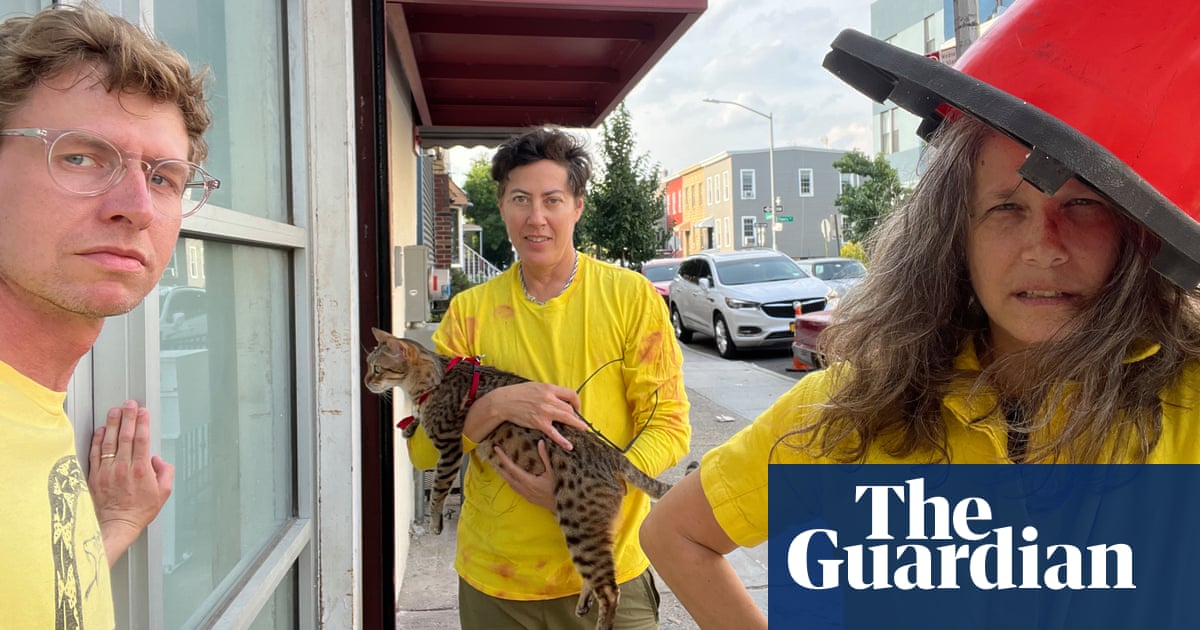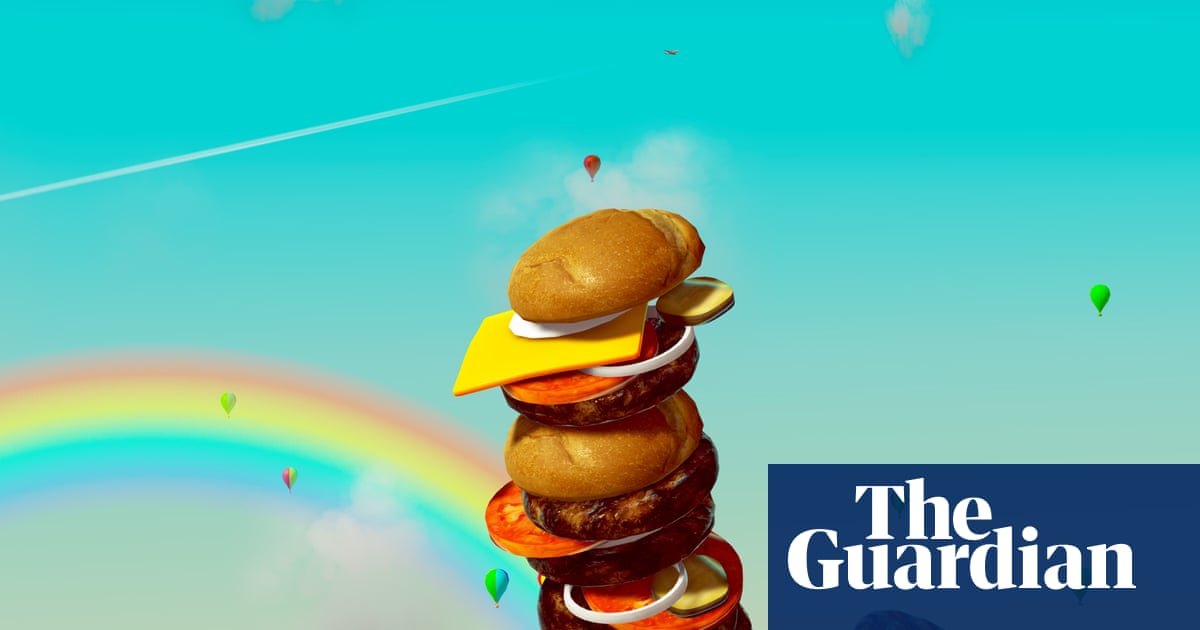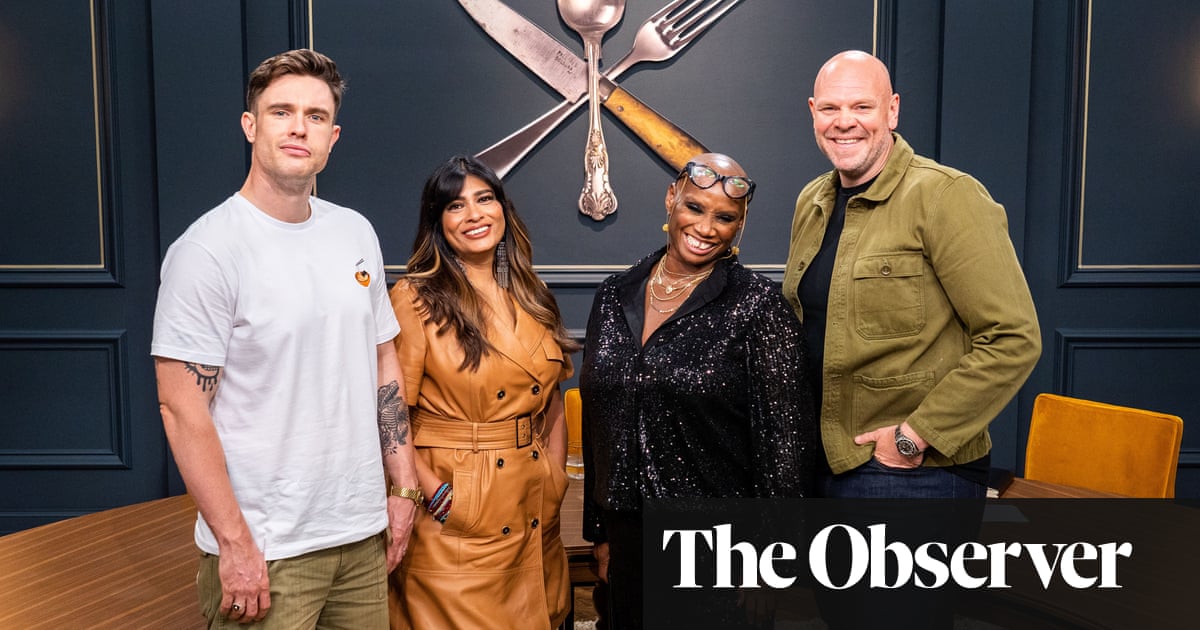
On first entering Ridykes’ Cavern of Fine Inverted Wines and Deviant Videos, which takes over the entirety of the Nottingham Contemporary Gallery this autumn, visitors encounter Rush Stadium: a prototype for a giant, arena-size space in which the audience would watch, via a monitor attached to each seat, the entirety of the world’s video art.
It makes for a wonderful installation: a wooden structure with a DIY vibe which gallery-goers enter, sit on carpeted platforms, don their headphones, and immerse themselves in the likes of Jacolby Satterwhite’s afro-futurist virtual world.
The “Rush” in the title of the stadium refers to an iconic brand of poppers, which typifies the playfulness of Ridykeulous, the New York-based collective behind the show. When I meet founders AL Steiner and Nicole Eisenman (along with Eisenman’s collaborator and “honorary dyke” Sam Roeck), they are even wearing branded red and yellow T-shirts adorned with the amyl nitrate bottle’s lightning-bolt logo. The initiative, which focuses on all things queer and feminist, has been a going concern since 2005, but Steiner (a former Berlin Prize winner and member of the band Chicks on Speed) and Eisenman (a MacArthur recipient focused on painting and sculpture) trace the roots of their co-venture back to the 90s.
Eisenman and Steiner were friends before they were co-curators, but under the Ridykeulous umbrella they’ve worked with the likes of Kara Walker, Kathy Acker and Eileen Myles (the latter contributed “a collection of angry art letters” for their 2011 show, Readykeulous). Their 2006 amendment of a Guerrilla Girls flyer, which changed it from “The Importance of Being a Woman Artist” to “The Importance of Being a Lesbian Woman Artist”, is typical of their best work.
One of the Dykes’ key aims is representation of the marginalised. “If you look at the 1970s, for example, lesbians would never get a show, there was no voice,” says Eisenman. “So a lot of our work is about institutional frustrations.”
Given the febrile atmosphere of recent times – book-banning, an increase in LGBT+ hate crime, the overturning of Roe v Wade – do they ever worry about, say, right-wing protests outside their exhibitions?
“The vigilance has never waned. It’s always been a violent culture,” says Eisenman. AK Burns, one of the show’s artists, chips in: “It’s a groundhog type of violence and scapegoating and hate.”
But people like Ron DeSantis, I say. I didn’t imagine someone like him succeeding given the progress that’s been made. Steiner (who was born in Miami) and Eisenman snort: “Florida isn’t a real place.” But it is for the LGBT+ people who live there.
Though the Dykes are serious in their work, humour is a huge part of how they operate. They’re a lively bunch, and this show – the collective’s first European outing – coincides with the Whitechapel’s straighter retrospective of Eiseman’s work.
As with many recent exhibitions delayed by the pandemic, the Cavern of Fine Wines … kept expanding its scope as the world shrunk. Eventually, the gallery’s chief curator Nicole Yip tells me, it seemed obvious that it would fill all four rooms. But there is a limit; the total running time of all the pieces comes in a shade under five hours. “We didn’t want it to be … well, boring,” the group laughs, joking-but-serious. How did they decide who to put in the show? “Well,” says Eisenman. “Some were frenemies, some our friends, our lovers, strangers we really wanted to meet …”
One of the lengthiest, and most impressive, pieces is the final instalment of AK Burns’ four-part epic Negative Space, which is called What Is Perverse Is Liquid (NS 0000). Negative Space, which Burns has worked on for eight years, has focused on different physical systems, but with overarching themes of ecological fragility, resource inequality and marginalised and subjugated identities.
What Is Perverse Is Liquid is a three-channel installation with sci-fi motifs and, as Burns puts it, “water as the protagonist”. It’s the most arresting thing here, hypnotic in its (sometimes literal) call-and-response with nature. There’s a stunning performance by Burns’s longtime sound collaborator, Geo Wyex, in a cave-complex – a duet with the sounds of water; droplets sliding off his piano keys.
Elsewhere, there are repeated closeups of an owl, eyes fixed, accusatory. A performer in a skeleton suit, representing Death, roams an abandoned IBM office as teenagers simulate menial tasks of the capitalist grind. With a nod to Marcel Duchamp’s Étant donnés, which Jasper Johns once called “the strangest work of art in any museum”, Death peeks around corners and peers through the gaps in lockers.
Beatriz Santiago Muñoz’s Oriana features equally gorgeous cinematography and sound (created by the Brazilian post-punk outfit Rakta). Her feature-length film (a half-hour excerpt is displayed here) is loosely based on Monique Wittig’s 1969 novel Les Guérillères. Filmed in Puerto Rico in the aftermath of Hurricane Maria, it imagines a postwar-of-the-sexes reality where the patriarchy has been toppled by female warriors.
Other, shorter, works are amusing, including The Divine David’s The World is Burning (Let’s Masturbate!) (1999), which, well … I’ve heard worse ideas. There’s also the charming 2 Lizards, one of the strongest if least outre works, which began life in the early days of the pandemic as an Instagram-published eight-episode animated surrealist series, by the Moroccan artist Meriem Bennani and Israeli film-maker Orian Barki. Its anthropomorphised titular lizards document the early-2020 quarantine existence, and earned its creators viral fame at the time. It’s a delightful improvised piece, shifting in tone from whimsical to profoundly sad even if it’s thematically incongruous with much of the show.
There are big names here, too: Sarah Lucas provides the eight-minute, Betacam-shot Sausage Film (1990), in which she slowly eats a banana and sausage, the non-erotic, awkward devouring of phallic foodstuffs typical of her career-long subversion of sexual innuendo; Charles Atlas contributes Turning Point + Guest, a large-scale, five-channel mashup of his previous works, Teach (1992/98), and Turning Portraits (2020), set to a new soundtrack. Atlas has been a frequent collaborator, and in these works he combines with the maverick club performer (and Lucian Freud muse) Leigh Bowery, and the trans songwriter and artist, Anohni. Teach, which was made after Bowery’s death, is a celebration of their friendship, while Turning Portraits is a remixed version of a collaboration with Anohni’s former band, Antony and the Johnsons.
It’s a strongly political show, as one would expect from Ridykeulous. Their own contribution is their 2011 film Times Square SCUM Manifesto, in which New Yorkers are tasked with reading Valerie Solanas’s 1967 feminist manifesto. Other overtly political works include Vaginal Davis’s The White to Be Angry (1999), which remains as urgent and relevant a film as it was two decades ago, in particular the central narrative of a skinhead – complete with Dr Martens, Confederate flag, and a breed of dog Rishi Sunak would almost certainly disapprove of – in an ambiguous and dangerous display of both violence and erotic attraction towards a queer protagonist.
While the show is mostly video, it is not the exclusive medium. The Guatemalan artist Naufus Ramírez-Figueroa’s The Soilt Queen (2010) is a humorous work of self-portraiture exploring existing monarchical deference in former British colonies. There will also be seven live situational performances, with Ryan McNamara – in brand new works inspired by the experimental fluxus movement – recruiting Nottingham locals to perform, among other scenarios, the wonderfully titled “funeral directors blowing bubbles”.
Whether all of this hangs together as a coherent whole is debatable. But it’s undeniably a show full of wit and joy. As Roeck tells me: “We have work that we love and worldviews that we love. We’re not here to proselytise.”
Ridykeulous (Nicole Eisenman & A.L. Steiner, with Sam Roeck): Ridykes’ Cavern of Fine Inverted Wines and Deviant Videos is at Nottingham Contemporary from 23 September until 7 January.












